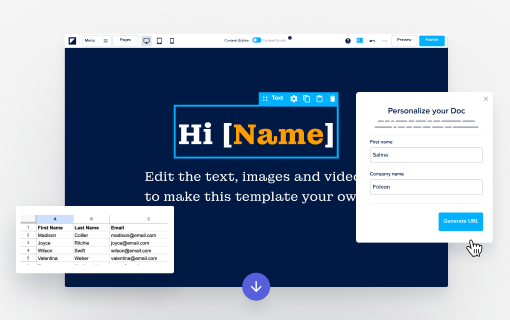Personalization is trending. It’s everywhere. That and what’s known as account-based marketing, aka ABM, is all the rage. As it stands now and as we go forward, some personalization in your marketing will be essential to win over your target audience, whether you're targeting businesses or customers. According to Segment, it already is. They reported that 69 percent of customers want a personalized and consistent customer experience across multiple physical and digital channels.
But that doesn’t mean you can customize your recipient's email and call it a day. The marketers and salespeople who want to stand out and go further are the ones who understand that personalization is much more than that. In this blog, we’ll dive into the benefits of injecting personalization into your marketing collateral and how to create a successful personalized B2B marketing strategy to unlock your content's potential and retain your customer base.
First things first:
What is personalization in marketing?
Personalization in marketing refers to a strategy that tailors content and interactions to meet individual consumer needs. It's about treating every prospect as unique and crafting campaigns that resonate with their preferences and behaviors.
Sales and marketers want to get their products in front of the right people and show how their products' benefits meet their target audience's needs. But really, it's just people talking to people, listening to their challenges, and being empathetic towards them. Personal or personalized content is for those who want to create a genuine connection with the people they target.
Personalization delivers tailor-made content to your segmented contact list in a couple of clicks, delivering a better reader experience that fosters lasting relationships, resulting in more impactful sales interactions.
Put simply, it is the ability to tailor a single Foleon Doc to one individual or a group of individuals at scale using automation.
With the right tools or content creation platform, you can reach thousands of target accounts with tailored content experiences addressing individual contact and company information at the click of a button. In other words, if you created a white paper explaining the benefits of your software, you could set conditions that show or hide content based on the industry of your contact.
For example, if you send out your white paper or report to a lead working in higher education, then conditions set in personalization will show case studies relevant to that industry in your content. This delivers a better content experience that fosters lasting relationships, resulting in more impactful sales interactions. Another robust use case for personalization is the ability to tailor pricing and packaging options in your sales proposal based on the size of your contact’s organization.
Essentially, when done right, personalized marketing can have outstanding results.
Try personalizing your content with Foleon
Benefits of personalized marketing
As you can imagine, the possibilities of personalization are endless when you have the ability to control what information in your newsletter, brochure, or online magazine gets sent to your contact list based on their attributes.
Here are three main benefits of personalization:
Reach contacts on a personal level at scale
When done right, personalization sends the message to your audience that they are understood and that you get it. You let them know that you genuinely empathize with them and believe you can help.
By showing hyper-relevant content in the consideration phase, prospects are more likely to flow deeper into your content marketing funnel.
Improved user engagement and conversion rates
When tailoring content based on the characteristics of your audience, you create a connection between you and the people you’re engaging, making them more likely to convert. Seventy-one percent of customers want businesses to provide personalized experiences, according to McKinsey.
Enhanced customer satisfaction
Creating a personal connection with your leads is not limited to new business. Customers are far more likely to remain loyal to a company when they feel their unique needs and requirements are being addressed. This directly influences the brand's positive perception, leading to repeat business and positive word-of-mouth recommendations.
Ultimately, leveraging personalized marketing leads to more enhanced customer experiences generates more leads, and creates longer-lasting relationships with your customers.
Discover: Why personalization matters in content marketing
Dangers of personalized marketing
Before we dive into a guide to creating a successful personalized marketing strategy, it’s essential that you understand the risks associated with personalized marketing.
One common issue with personalized marketing is privacy and data security. Collecting and utilizing vast amounts of personal data to tailor marketing strategies can encroach on privacy boundaries, leading to customer discomfort and mistrust. Misuse or mishandling of this data could result in breaches, exposing sensitive information to unauthorized parties.
Aside from data protection, over-personalization can backfire in some cases. Customers can be overwhelmed by overly targeted advertisements and messages, causing a negative brand perception. If there’s too much personalization, it can come off a bit creepy, which isn’t exactly ideal.
Striking the right balance between personalization and privacy is crucial to mitigate these risks and maintain a positive customer relationship.
How to create a successful personalized marketing strategy:
Now that you understand what personalization is and the benefits it can give you, it's time to dive into how to create a successful personalized marketing strategy.
1. Set up a team to launch the initiative
Most companies understand that personalization is becoming essential for winning over customers and building lasting relationships. However, only a small percentage of marketing teams have a process to carry out personalization successfully. Why? Often, we overlook one of the most critical aspects of building a successful personalized marketing strategy: assembling the right team.
If you’re operating in a leaner team, set up a personalization squad of at least three people: a marketer (ideally someone who can execute your plans), an executive sponsor to make the final call on decisions, and someone focused on the customer experience who understands the problem you’re trying to solve.
You can go further with your personalization strategy if you have more resources and a larger team. In addition to your executive sponsor, your CX person, and your marketer, you’ll want to build out your personalized marketing squad with a Project Manager to keep everything and everyone organized. Including someone who can dive deeply into your business's tools to measure web performance is a good idea. Depending on the channels you’re personalizing, you’ll most likely need to pool resources from other team members, e.g., marketing specialists for specific channels or product managers.
2. Collect data, but don’t forget to ask
To get your personalized marketing strategy off the ground, you’ll need a fair amount of data. Carrying out personalization requires a deep understanding of your customers and target audience. You must gain a comprehensive overview of their behaviors, preferences, and interactions. That said, ensure you’re following the appropriate guidelines for data collection, and remember that data transparency is always appreciated. People respect being upfront about your data collection, so when collecting data, ensure you gain consent, especially concerning sensitive data.
Start by gathering essential data types, such as demographic, psychographic, and behavioral data, to understand your audience better. Then, you can look into transactional and geographic data to personalize even further. Analyze and interpret this data to gain actionable insights that will guide your personalized marketing strategies effectively.
3. Leverage data to segment
Now that you’ve collected the relevant data, you can identify the criteria for segmentation, such as demographics, psychographics, or behavior. Use these criteria to categorize your customers into specific groups, allowing for tailored marketing approaches.
Remember to continuously monitor and refine these segments to align with evolving customer preferences and optimize your marketing strategy.
Creating detailed customer profiles for each segment is a good idea to encapsulate individuals' characteristics, behaviors, and preferences within each segment.
Discover: How to create detailed buyer personas.
4. Figure out where to personalize
To determine where to implement personalization efforts, map out the buyer journey. This means sketching out every interaction with your brand, from their first to the point of conversion and after. This journey involves multiple touchpoints, visits to your website, social media and email interactions, product searches, and purchases. Analyze these touchpoints to identify which are the most impactful. That’s where you should start personalized marketing.
Crafting personalized content and messages for these touchpoints ensures your engagement is tailored to their needs at various stages of their journey. Leveraging dynamic content and algorithms allows you to automate and scale these personalization efforts, providing a unique and individualized experience for each customer based on their interactions and preferences.
Driving personalized marketing through content
At the core of a personalized marketing strategy lies content. You have to communicate with your customers and need engaging content to do so. If you can infuse your behavioral data with content interactions, you can gain critical insights into user preferences, enriching the ability to craft content that resonates with individual preferences.
Foleon's versatile toolkit empowers you to transform content into an interactive experience, allowing you to gather real-time data on user engagement and preferences through interactive elements.
By harnessing Foleon's capabilities, you can create engaging and bespoke content, enhancing user satisfaction, driving conversions, and effectively achieving your marketing goals.
Unlocking customer retention with personalized content
Personalized marketing allows you to identify and prioritize high-value customers, ensuring you provide tailored experiences to retain those who contribute the most to your business. On top of that, personalized marketing enables you to deliver relevant and timely content, product recommendations, and offers that resonate with each customer, enhancing their loyalty.
Consistently engaging with customers on a one-to-one basis through engaging, personalized content allows you to build stronger, more meaningful relationships. By addressing their concerns and demonstrating that you value their business, you foster a sense of loyalty and connection essential for long-term customer retention.
Final thoughts
In conclusion, personalized marketing, driven by a dedicated team, transparent data collection, and strategic content integration, offers a powerful means to connect deeply with your audience, fostering engagement and loyalty while navigating the associated risks. Foleon's versatile platform facilitates the infusion of interactive elements into content, unlocking a new era of content personalization for enhanced user satisfaction and successful marketing outcomes.
Psst... If you're curious to see how personalization can improve your content performance, then you should test Foleon.



